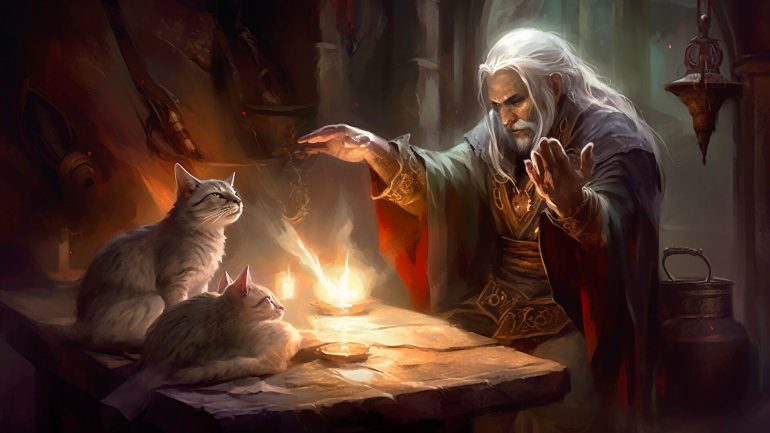What is Find Familiar 5E?
Find Familiar 5E (PHB, p. 240) is a 1st level conjuration ritual spell only natively, and iconically, available to Wizards. It requires a vocal, somatic, and material component, with the latter being 10 GP worth of incense, herbs, and charcoal that are consumed by a fire in a brass brazier. It takes one hour to cast, or one hour and ten minutes if you cast it as a ritual, and summons a spirit into an animal form (list below) within ten feet of you. The familiar exists until it is reduced to zero hit points or is dismissed by you as an action. Casting this spell again whilst your familiar still exists allows you to change its animal form. You can only have one familiar at a time and when you don’t need its services you can spend an action to dismiss it into a pocket dimension. Whenever the familiar enters its pocket dimension or hits zero hit points, it drops whatever it was wearing or carrying.
Whilst within 100 ft. of your familiar you can communicate with it telepathically and can spend your action to see and hear what it can for that turn, leaving yourself blind and deaf to your own surroundings in the meantime. The familiar can’t take the Attack action but can take any other action and participate in combat, rolling its own initiative and following your orders. Your familiar can deliver some of your spells on your behalf, when you cast a spell with a range of touch, it can originate from your familiar instead. Your familiar must use its reaction to deliver the spell and must be within 100 ft. of you when you cast the spell.
When you summon your familiar you can choose from one of the following forms: bat, cat, crab, frog/toad, hawk, lizard, octopus, owl, poisonous snake, fish/quipper, rat, raven, sea horse, spider, or weasel.
Whichever animal form you choose for your familiar, it is a celestial, fey, or fiend instead of a beast, you choose which. Additional forms may be available to choose from, such as a tressym, at your DM’s discretion.
Is Find Familiar 5E a good spell?
It’s an excellent utility spell, the limits of which are your imagination and your DM’s permission. The clearest use of the spell is scouting and information gathering, sending your familiar out to recon areas ahead of you or hiding somewhere to watch and listen. A common tactic in combat for familiars is to have them use the Help action, giving advantage on the next attack against that creature. This is a great support tactic, which can allow some Rogues, primarily the Arcane Trickster, to set up their own Sneak Attack. Using the Help action is best done with familiars that have the Flyby feature, such as an owl, or the ability to remain invisible, such as an imp, to minimize the risk of losing the familiar. You can even weaponize your familiar with the 2nd level spell Dragon’s Breath, as it doesn’t require the Attack action, any familiar can use the AoE it provides.
The value of Find Familiar is best realized when you can enhance your familiar in some way, this is most commonly seen in the Pact of the Chain Warlock, which can use various Eldritch Invocations to empower their familiar, and the connection they share with their familiar. However, you can enhance a normal familiar in many ways by using various spells and features on them. Examples of this include the spells Mage Armor, Longstrider, Invisibility, Aid, and Sanctuary, in addition to any feature that grants temporary hit points, such as Inspiring Leader.
Whilst the value of Find Familiar can be great, the largest downsides are the material component and the casting time, so you should consider the very real possibility of the familiar being destroyed when using it. The gold cost can add up at lower levels, with the components themselves possibly not easily available for purchase in large quantities depending on your DM. The length of the casting also means that you may have difficulty resummoning your familiar during the course of some adventuring days, so use your familiars in combat with this in mind.
How can you get Find Familiar 5E spell?
If the idea of this magical companion interests you, then don’t worry! There’s a surprisingly long list of ways you can grab this great spell:
- Wizard – This is the only class to natively get access to Find Familiar on their spell list, with it being an iconic part of their magical repertoire.
- Arcane Trickster (Rogue Subclass) – This Rogue can choose spells from the Wizard spell list, and can choose Find Familiar as one of their unrestricted spells as early as 3rd level.
- Eldritch Knight (Fighter Subclass) – Similar to above, this Fighter subclass can choose spells from the Wizard list and can choose Find Familiar with one of their limited unrestricted choices as early as 3rd level.
- Pact of the Chain (Warlock Feature) – This feature grants you the Find Familiar spell, in addition to being able to cast it as a ritual. In addition, instead of the normal animal forms, you can instead have your familiar take the form of a pseudodragon, quasit, sprite, or imp. These forms are significantly more powerful and versatile than the standard forms and can attack on your behalf if you take the Attack action and forgo one of your attacks. This feature also allows you to empower your familiar by choosing Pact-exclusive Eldritch Invocations, giving a variety of boons from increasing the range of your mental connection with your familiar to increasing the DC of their abilities.
- Book of Ancient Secrets (Warlock, Eldritch Invocation) – This invocation is limited to Warlocks that took the Pact of the Tome and allows you to choose two 1st level ritual spells of your choice from any spell list. They then count as Warlock spells for you and can be cast as rituals, only rituals, whilst you are holding your Book of Shadows.
- Wild Companion (Optional Druid Feature) – This optional class feature from Tasha’s Cauldron of Everything (TCoE) allows you to cast Find Familiar by expending a use of your Wild Shape feature. When casting the spell in this manner it only takes an action and doesn’t require any material components. The familiar created this way is always a fey and only exists for a number of hours equal to half your Druid level rounded down.
- Magical Secrets (Bard Class Feature) – This feature allows a Bard to choose a spell from any spell list and make it a Bard spell, this is an expensive way to gain this spell, as there are many higher-level spells you can choose instead.
- College of Lore (Bard Subclass) – This Bard subclass gets Additional Magical Secrets at 6th level, allowing them to choose any two spells of 3rd level or lower from any class’s spell list. This is a more realistic way of gaining Find Familiar as a Bard, as the opportunity cost for choosing it is far less than using one of your main, higher-level Magical Secrets.
- Magic Initiate (Feat) – You can take Find Familiar as the spell you can cast once per day if you choose the Wizard spell list.
- Ritual Caster (Feat) – By choosing Wizard as the spell list for this feat you can cast Find Familiar as a ritual.
- Strixhaven Initiate (Feat) – By choosing the Lorehold option you can choose a 1st level Wizard spell of your choice, which you can cast with your spell slots and once per day for free.
- Strixhaven Mascot (Feat) – This feat requires that you already have the Strixhaven Initiate feat, but for your trouble, you gain the ability to cast Find Familiar as a ritual along with other benefits. Instead of the normal selection of animals, you can choose to summon a mascot of one of the five colleges of Strixhaven. These creatures are more powerful CR 1/4 creatures, each with their own unique abilities, that you can have attack by taking the Attack action and forgoing one of your own attacks. In addition, you can also switch places with your familiar by teleporting as an action.
How to roleplay the Find Familiar 5E spell
Need some help roleplaying the Find Familiar spell? Here are some examples to help you out:
- As you cast the spell, you feel a strange connection with the magical energies around you. Suddenly, a small creature materializes before you, its eyes wide and curious as it looks up at you. This is your familiar, a loyal companion that will aid you in your adventures. What kind of creature do you summon? A wise old owl, a nimble and mischievous cat, or perhaps a loyal and steadfast dog?
- You close your eyes and focus your mind, calling out to the spirits of the natural world. As you open your eyes, you see a shimmering figure coalesce before you, taking the form of a tiny sprite. It hovers in front of you, its delicate wings fluttering, and it greets you with a mischievous grin.
- As you chant the words of the spell, a soft breeze begins to blow around you. You feel a weight settle on your shoulder, and when you look, you see a tiny bird perched there, its feathers shimmering in the sunlight. It chirps a greeting to you, and you realize the depth of your connection to this magical creature.
Hopefully, this article gave you some enchanting suggestions for your next character build. if you’re interested in the idea of having an uncommon or empowered familiar, then check out our Warlock 5E guide, or If you’re interested in researching other spells then check out our 5E spells section, Good luck out there adventurers, until next time, remember to clean up after that owl!






